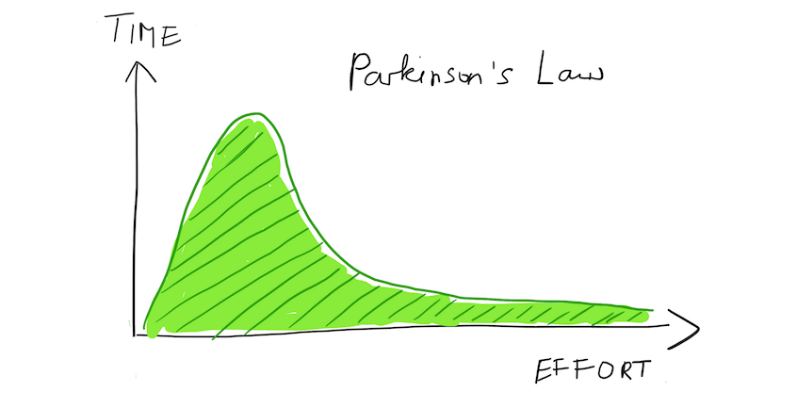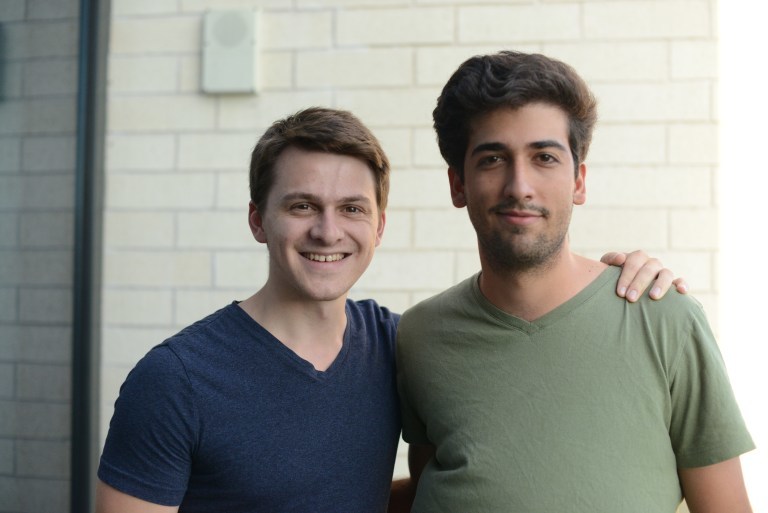Parkinson's Law: Get More Done in Less Time

"If you want something done, ask a busy person".
It's Saturday morning and you've got the whole day to yourself. So much time, and a bunch to do, you think to yourself as you sip your freshly brewed coffee. As you sit at your desk and begin working for intensely for 30 minutes, you decide to reward yourself with 5 minutes of scrolling through social media and Youtube. These 5 minutes turn into one hour, which turns into three hours. You look at the time and are shocked to see that t's already 4 PM! Well, the day is pretty much over, I'll try again tomorrow...
So What is Parkinson's Law Exactly?
Parkinson's law -> the amount of work expands as to fill the time you have to complete it. First coined in 1955 by Cyril Northcote Parkison, was actually not a catchphrase, but instead a statistical equation describing the rate at which bureaucracies expand over time. It has since then gone on to be popularized as a law describing the output in work we do in expanding and shrinking time frames.
Many people use the phrase to describe why people procrastinate so often and it makes sense. In school or at work, when given a deadline far away, no matter how much we tell ourselves we're gonna work on the task little by little, day by day, we always seem to wait till the last couple of days (or day) to complete it. Most of the time, although it's stressful we pull that all-nighter or that 10-hour sprint in order to complete the task that should have taken one month. The shorter the time frame gets, the more our brain starts to dial in and focus, so no matter how big the task, most of the time we can get it done in a couple of nights before the due date. This also applies the other way around, no matter how small the task, if we're given a long time frame we will wait to fill that time up before completing the task.
So knowing this, how can I get more stuff done?
The answer to this is simple: give yourself shorter time frames. If you have a project or an essay due in a month, give yourself a week to finish it, and write it on your calendar. The key is to fight the voice in the back of your head saying you have so much time because, in reality, you don't. Besides writing it on your calendar you can verbally make a commitment to someone such as your friends or family. If you're feeling really courageous you can tell your boss or teacher that you will have it finished within a week. Worse case is you don't get it done in that week and you still have three weeks left, but most of the time you will get that shit done.
Another way to get yourself to stick to a shorter time frame is to reward yourself if you stick with it. Whether it be a dinner out with friends or buying yourself the sweater you've been eyeing. The important thing here is making the habit of sticking to your commitments. Once you start achieving your first couple of short term goals, the momentum will start kicking in, and most importantly the identity of being a productive person who gets their shit done early will start to take hold. Why is identity so important?
The days or weeks we don't feel motivated, it is the identity we cling on to that will push us to do our work. If you label yourself as a runner or someone who loves exercise, you will get out of bed to go out for your 5 mile run no matter how cold or dark it is outside because as human beings we like to do things that coincide with who we believe we are. For more on this topic and habit forming, I highly recommend checking out Atomic Habits.
Why Having A Lot To Do Can Make You More Productive

I first heard of Parkinson's Law a couple of years ago while listening to episode #354 on Tim Ferris's podcast. (Link here if you're interested) In this episode, Tim interviews two Dartmouth students, Benedict and Santiago, who created their own 8 figure business selling custom made products on Amazon. What intrigued me the most, was the fact that the two weren't planning on dropping out of college, and were still attending all their classes.
Most students struggle just to keep up with school, and there are plenty of business owners who struggle just to get by. So how in the world do two 21-year-old students succeed at both? And of course, the answer they gave was good ol' Parkinson's law. Benedict said that if they dropped out of school, and had the full 24 hours to work on the business, that they wouldn't be as focused and efficient because they would fall into the fallacy that they have so much time. He says that school work grounds them and allows them to cherish the small amount of time that they have. So when free time comes around, they use it to its fullest.
So what does that mean for us? No matter how "busy" you think you are, you can take upon a lot more than you think. Contrary to what should happen, picking up an instrument or sport up, or starting your own side hustle will actually help you get more things done over the long term and will lead to an overall more fulfilled life. In the beginning, it will be tough and many times your gonna feel overwhelmed but keep sticking with it, and you're gonna see the power of Parkinson's law in action. You're essentially teaching your brain to truly value your time.
What many people don't realize is that time is the most precious resource on this planet, it's something that money can't buy more of. We need to understand that we're not really living, we're slowly dying. Once you get this drilled into your brain you begin to see that the two hours you spend watching Netflix are two hours you just spent dying on that couch. I'm not saying not to relax and have a good time with your friends, these things are on the contrary very important for long-lasting productivity. What I am saying is that don't turn to these things when you don't want to do work, and create a bad habit of escaping to them every time you have to do something hard.
Conclusion
If you lack a lot of intrinsic motivation I recommend blocking out all the hours of your week on Google calendar. As Cal Newport says "A 40 hour time-blocked work week produces the same amount of output as a 60+ hour work week pursued without structure." The main thing to practice on a daily basis is not only cultivating a sense of urgency and busyness but making sure you are moving in the direction of your goals. Don't confuse being busy and being productive. Parkinson's law has helped me achieve many of my goals, and I hope understanding and practicing the law will do the same for you.